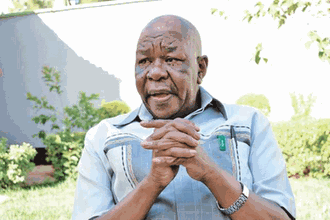FRANCIS IMBUGA
Biography
Francis D. Imbuga is by far one of Kenya's most influential playwrights and intellectuals. Born in Wenyange Village, West Maragoli, Kenya, Imbuga’s interest in the theater developed at an early age. Raised in a loving and supportive environment, the influence of his parents and grandparents, who taught him the importance of traditional values, would inform much of his perspective on life as well as his work. The dance, the proverb, the etiquette, and decorum of the African world dominate his plays and life.
Francis attended the University of Nairobi, receiving his BA in education in 1973 and his MA in drama in 1975. Francis studied as a visiting student at various African institutions including the University of Ghana, Legion and the University of Ibadan, Nigeria. During this period of study, Francis encountered the works of African writers who would reinforce the upbringing he received from his elders to resist colonial influences and return to traditional values. Writers Elvania Zirimu, Peter Nazareth, Jonathan Kariara, and Okoto p'Bitek were among his influences. However, the writer who influenced him the most was Ngũgĩ wa Thiong'o, whose works Weep Not Child and The Black Hermit helped shape Francis's own philosophies and writing styles. In 1988, Francis left his teaching post at Kenyatta University to pursue his doctorate studies at the University of Iowa, which he completed in two and a half years.
Francis's theatrical career can be divided into two phases. His early works such as Kisses of Fate (1972), The Fourth Trail (1972), The Married Bachelor (1973), and Game of Silence (1977) use domestic settings to dramatize the tensions between African and Western sociocultural values that resulted from the emergence of an educated elite on the African Continent. His later works such as Betrayal in the City (1976), The Successor (1979), and The Man of Kafira (1984), decry government corruption in contemporary African republics, exposing the deplorable selfishness of the new leaders. (Full Bio)*
Plays
The Fourth Trial (1972)
One of Imbuga’s earliest plays, The Fourth Trial centers on the story of a childless couple, Musa and Hellen, who blame each other for their inability to have a child. (Source)
Cast Requirement: 7 (2f, 5m)
Characters: Musa, Hellen, Makonde, Ruza, Onono, Tondo, Mukembo
Publication Info: The Fourth Trial. Alexander Street Press, 2002. (Link)*
Kisses of Fate (1972)
Kisses of Fate furthers the theme of sociocultural responsibility by exposing an incestuous relationship between a brother and sister. Both have been separated for a long time, and the riotous encounter of a promiscuous student life provides the occasion for the incest. (Source)
Cast Requirement: 9 (3f, 6m)
Characters: Rocho, Lena, Bombo, Yohana, Matilda, Matia, Geoffrey, Dorris, Julius
Publication Info: Kisses of Fate. Alexander Street Press, 2003. (Link)*
The Married Bachelor (1973)
The Married Bachelor portrays the escapades of Denis, a university lecturer of culture, who is caught between the conflicting claims of his father’s traditional culture and the demands of urban life. (Source)
Cast Requirement: 11+
Characters: Bandi, Agala, Elima, Babu, Yohana, Mary, Denis, Henry, James, Oculi, Village Drummer, Circumciser, Villagers, Dancers
Publication Info: The Married Bachelor. Alexander Street Press, 2003. (Link)*
Betrayal in the City (1976)
The play revolves around the murder of a student activist, Jasper Wendo, by a dictatorial postcolonial regime, and this murder is used to dramatize the abuse of power, nepotism, corruption, and repression in the fictional post independence state Kafira, an anagram of Africa. (Source)
Cast Requirement: 12+
Characters: Doga, Nina, Jasper Wendo, Jere, Mulili, Askari, Mosese, Regina, Tumbo, Kabito, Nicodemo, Boss, Guards, Palace Staff, People
Publication Info: Betrayal in the City. Proquest LLC, 2005. (Link)*
Game of Silence (1977)
In this vertiginous psychodrama, Raja— an African student returning home from studying abroad— traverses a pathless terrain of dreams and hallucinations. He suffers a devastating loss, but it is unclear whether it is his daughter or his sister who has died. He is confined against his will, but it is unclear whether he has been institutionalized for psychosis or jailed for sedition. The closest he comes to a diagnosis is a thinly veiled political threat: “You suffered a severe stroke of political insanity, an infectious disease that seems to be spreading fast, and to which we attribute the present wave of strikes in the country.” (Source)
Cast Requirement: 11+
Characters: Raja, Bango, Emma, Flora, Jimmy, Zumaka, Elder, A Man, 1st Spectator, 2nd Spectator, Son of the Lion, Village People, Beggars, Madmen & Cripples, Drummers, Dancers
Publication Info: Game of Silence. Alexander Street Press, 2003. (Link)*
The Successor (1979)
Set in Masero, a fictional “semi-modern African empire.” Oriomra, one of the high-ranking chiefs of Masero, approaches the diviner Dr. See-Through to ask him to interpret the emperor’s dreams in such a way that he will be led to name his successor to the throne. Dr. See-Through meets and exceeds this mandate by not only prompting the emperor to name his successor but also exposing the machinations of chiefs like Oriomra to eliminate their rivals. (Source)
Cast Requirement: 17+
Characters: Dr. See-Through, Zira, Ademola, Demokola, Chief Oriomra, Chief Sasia, Emperor Chonda, Sega Sega, Kaliyesa, Horn-blower, Akiuso, Kaisia, Vunami, Rita, Chief Jandi, Messenger, Guards, Crowd
Publication Info: The Successor. Alexander Street Press, 2003. (Link)*
Man of Kafira (1984)
Man of Kafira exploits a play-within-a-play technique as it follows the fortunes of Boss, the dictator, in exile in Abiara (an anagram of “Arabia”), where he is haunted by his past but still dreaming of recapturing power. (Source)
Cast Requirement: 5+
Characters: The Emperor, Sega Sega, The Seer, Boss’ Wines, Other Women, Omolo, Sober Men, Messenger
Publication Info: Man of Kafira. Alexander Street Press, 2003. (Link)*
Aminata (1988)
Aminata’s father leaves her a piece of land in his will, but this creates a conflict between her and her brothers because according to tradition, a woman should not inherit land. (Source)
Cast Requirement: 15+
Characters: Jumba, Nuhu, Ndururu, Mbaluto, Mama Rosina, Agege, Ababio, George Mulemi, Kezia, Aminata, Nagoya, Midambo, Amata, Lorna, Abade, Elders of the Stool, A Crowd, Dancers
Publication Info: Aminata: a play. Heinemann Kenya, 1988. (Link)
The Burning of the Rags (1989)
The Burning of Rags focuses on the cultural conflict between the existing cultural forces and the emerging: a clash of modern and traditional. Denis, a young professor is in a dilemma : he is required to participate in a cultural activity-the initiation of his son into manhood:, even if the rudimentary practice of the circumcision is contrary to his modern beliefs. Agala, his old father refuses to compromise the old existing tradition to suit his son's " civilization ". Denis also hides his past (being formerly married and having a child) from his mistress because he feels that that belies him, unknown to him his mistress Hilda, has a similar story to tell. Burning of Rags is an African drama, reflecting the ongoing culture conflict in the society: a theme which comes closely after the theme of the collapse of colonialism and as such a consequence of new lifestyles. (Source)*
Cast Requirement: 9
Characters: Matilda, Yona, Agala, Elima, Bandi, Babu, Hilda, Denis, Dr. Agbale, Henrics Fisher
Publication Info: Heinemann Kenya, Nairobi, 1989. (Link)
The return of MGofu (2011)
The play speaks about post-election violence. If follows is the story of Thori and his wife Thoriwa who return from the other world to deliver a succinct message that neighbours must stamp out resentment, kill the blame-game and seek reconciliation. (Source)
Cast Requirement: Unknown
Characters: Unknown
Publication Info: The Return of Mgofu : A Play. Nairobi Kenya: Longhorn, 2011. (Link)
The Green Cross of Kafira (2013)
In his last play published posthumously the late Francis Imbuga presents the dramatic dialogue of his characters as mind games. In addition to using a narrator, Sikia Macho, to fill us in on the broken politics of Kafira, centring around detention without trial, Imbuga deliberately delays the inciting action, the formation of the Green Party of Kafira which then challenges the hitherto political monolith called the National Party. The candidate of the new party, former detainee Pastor Mgei, wins the election, and thereby dethrones the so-called Chief of Chiefs. In The Green Cross of Kafira, Imbuga, with a renewed sense of urgency, addresses the theme of dictatorship in Africa, and completes his trilogy of the Kafira plays which begins with Betrayal in the City followed by Man of Kafira. (Source)
Cast Requirement: Unknown
Characters: Unknown
Publication Info: Imbuga F. D and Kurtz Rogers. The Green Cross of Kafira. Nairobi Kenya: Bookmark Africa. 2013. (Link)
Resources
Other writings by IMBUGA
Novels:
Shrine of Tears. Longman Kenya, 1993. (Link)
Miracle of Remera. Nairobi Kenya: Africawide Network, 2004. (Link)

